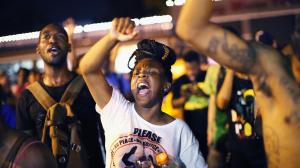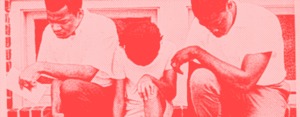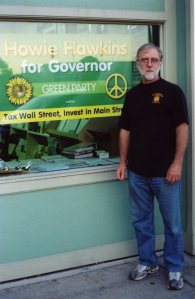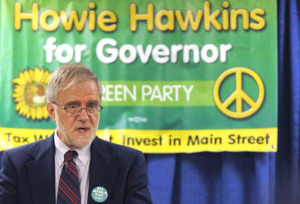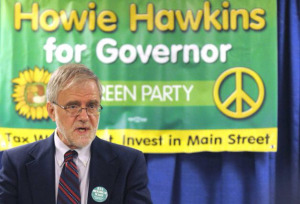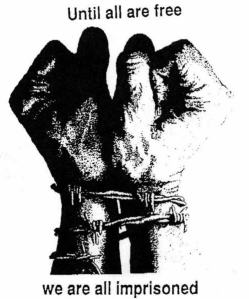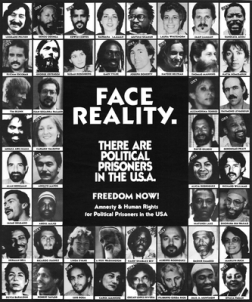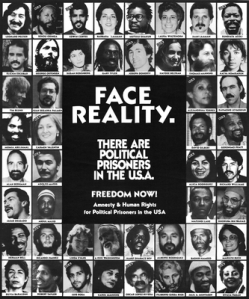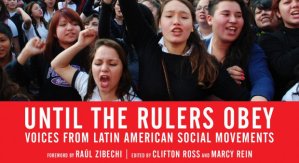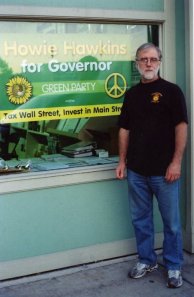
(This interview was originally published in 2010 on Znet and in the Industrial Worker. The full interview can be found here: http://howiehawkins.com/2010/index.php/interviews/399-interview-by-brendan-maslauskas-dunn)
Brendan Maslasuaks Dunn (BMD): I understand you spent some time in the Bay Area growing up. What were you politically involved with back then?
Howie Hawkins (HH): Well, Willie Mays was a San Francisco Giant and he was my hero and this was in the Bay Area and this was in the 60s so… I cut school one day when they were doing the ban the draft week and went over there and was on the periphery of one of those demos that week. The next year the big thing was the San Francisco State strike so I went to some of those activities that was basically trying to get autonomy for the black studies program so they could serve the community so I learned a lot from that and got familiar with a lot of the different tendencies in what was called the New Left back then. One of the things that influenced me was there was something called Ecology Action West which I later learned was all written by Murray Bookchin. So that Post Scarcity Anarchism with an ecological orientation and libertarian socialism – that was probably one big influence on me back then. [I] also ran into Hal Draper’s Socialism From Below pamphlets that the independent socialists were circulating and understood the distinctions between statist socialism that was authoritarian and socialism from below which was democratic. I’m in high school and new to all this and they’re sure not teaching us much about this in high school.
I remember on Earth Day, 1970 I organized the Earth Day at my school and wrote up a sort of handbook on the issues and called for corporations basically to be run as public utilities without the profit motive but to serve production for use and not try to grow endlessly like capitalism makes companies do endlessly in order to survive and I sort of got to the conclusion without understanding the whole analysis of how to get to it. There were demonstrations over at Berkeley and I went over to one I remember when Peoples Park was breaking up and I was there the day before the kid was shot to death. I cut school and went there so I was absorbent of a lot of this stuff as sort of a truant who was really going to political protests which was sometimes just a library across the railroad tracks from the high school because high school was kind of slow and there was a lot of antiwar demos in the Bay area that I went to so I absorbed a lot from the movements there.
BMD: I also understand you’re a socialist. Given the dark history of what was done in the name of socialism, why do you call yourself one?
HH: Well, any word is contested. I mean you have democratic republics that are dictatorships so democracy – do you want to abandon that word? Do you want to abandon the idea of a republic? I think we need an alternative to capitalism which most people understand to be profit oriented enterprise and appropriation of surplus by the owners. So what is socialism? It’s democratic appropriation and allocation of economic surplus by the people. I would say a little different from some socialists who say the producers because in any economy in any one time it’s something like, at most, you have about 40% of the people actually working. You have young people, children, you have old people, you have injured people so everyone should have some say in how the surplus is distributed and the forms that those socialist economic institutions could take can be public in the sense of like a municipal power utility, they can be cooperatives where the users (the people that contribute to the enterprise) dispose of the net income and you have consumer you have producer or worker you have marketing coops you can have hybrids of producers and consumers… but the point is that what is produced is how you dispose of it, is the democratic decision – it’s not just to those who happen to own the property and I think that that’s an important idea that America, out of all the countries of the world, has just sort of erased form discussion. So I think it’s important to keep that on the table. Now when I campaign I don’t campaign for an ideology – socialism or even ecologism or green – green’s a label we use but, I campaign for concrete reforms that more people can understand on their own terms. Now a lot of those reforms; for example, a right to a job and a living wage which requires direct public employment to ensure everyone there has full employment, is not compatible with a capitalist economy, not because you couldn’t with government help have a market to get everyone employed between public and private employment because the vested interests who own the capital in the capitalist sector, they want unemployment to discipline the workforce and keep wages down. So, for me socialism for me is an extension of democracy into the economic realm.
BMD: I was wondering if you could speak a little bit about, maybe one or two movements you’ve been involved with in your life that have really had an impact on you.
HH: Well, I think the anti-Vietnam War movement, in particular the GI movement… and when I got drafted I did enlist in the Marine Corps before the draft letter got me. My number came up – it was the last call for Vietnam – July ’72 and the Defense Secretary Laird(sp???) called up numbers 35 through 70 and I was number 65, so… you know I had looked at my options and decided rather than going into exile or underground I would go into the service and first thing I did was join the American Serviceman’s Union which was actually the front for Workers World Party, you know they really ran it, but it was an effort to unionize and resist imperialist war. And by the time I did it, I wasn’t sticking my neck out so much, I mean I can remember one of the things that I saw, this is when I think I was a freshman in high school was the Presidio 27 refusing to go to Vietnam out of San Francisco and they really paid a price for that. And there was the GI Coffee House movement… Anyway, by the time I was in the resistance, particularly in the Army, I mean Nixon had to Vietnamese the war as they called it – bring the troops home and let the Vietnamese fight with our funding because our soldiers, in the Army in particular, they weren’t fighting, they were refusing, they thought… they didn’t like the war. And it even affected the Marine Corps. I went in – this was officer training – I was in college and it was an off-campus program. And actually the veterans who had been there as grunts and then come back to college on the GI Bill and were now coming back into the Marines to be officers, they were pretty anti-Vietnam War. It was amazing. The “gung ho” Marines were the kids that were just coming straight out of college and wanted to be Marines; you know the whole image around that. So I just think that’s an underestimated but powerful movement that’s a more working class movement than a lot of the movements of the 60s because it was working class people that tended to get drafted and go fight and resist.
So that was something that really stuck with me and made me understand also the importance, when you’re getting back to domestic affairs, the importance of building a strong labor movement. So what I ended up doing after college was construction up in northern New England where none of the jobs were union except really big projects and those guys came in from out of state. You know, nuclear power plant, sort of big college dorm construction, although I did some of that but it was a non-union shop. So I joined the Wobblies just so I had an affiliation. There were no other Wobblies anywhere around, except we had a couple of guys, we had a worker co-op for a while – we were all Wobblies but I wanted some affiliation, at least in spirit. I’ve kept that affiliation since then. And I’ve been involved in a lot of labor support struggles – the JP Stevens textile struggle in the South, I was really involved with the Phelps Dodge struggle, the miners in Arizona. The same thing happened today as what happened to miners in Namibia, owned by the same company – Phelps Dodge, they struck when it was in Namibia, they were sent… this actually happened a long time ago in Arizona. In both cases they just put the workers on a train and sent them out to the middle of the desert and just dropped them off in the desert. And I got involved with that because the Chairman of the Board of Trustees at Dartmouth was the President and CEO and Chairman of the Board of Phelps Dodge. So we did a lot of work around that and even the AFL-CIO national office came in and we did a whole corporate campaign around that. There were UFW grape and lettuce boycotts. And then since I’ve been in Syracuse, there’s labor actions, there was one [recently] at Coyne Textile Services a couple blocks from here, and I’ve been out at the Motts strike in Williamson and out at the Momenta Processed Materials rally back in June. And it’s a big part of my campaign for governor. So I think I’ve been inspired by the labor movement – not so much the official labor movement but the real labor struggles that people have when they get attacked by employers. And we haven’t won a lot, I mean one thing, before I came to UPS and became a Teamster I was really supportive and glad to see they’d won that UPS strike in 1997. It was one of the few big strikes that the labor movement won in a generation, going back to the 60s.
BMD: What exactly attracted you to the Wobblies and how has an IWW analysis of the labor movement and the economic system we live under had an effect on your outlook?
HH: The Wobblies are an inspiration given their history. I mean, they organized people that the AFL wouldn’t organize – the migrant workers, the minority worker, the workers in dirty, dangerous jobs like mining. They were relatively antiracist in a time racism was really strong in this country, in the nineteen-teens – this is when they were strong and they’ve kept that spirit alive. They also are very big on democracy at a time when the mainstream labor movement is bureaucratized. And the Preamble, the Wobblies’ classic document that’s inspirational to this day. So, all those things attracted me to it and it has informed me, you know, I have not really been engaged in any Wobbly activities because they haven’t been where I live at. And I think that [construction] is an industry where Wobblies can make really big inroads because there’s a lot of small construction, home construction that’s being done. Even in New York City which is a union town a lot of the rehab work is being done by immigrants who are being paid less than a minimum wage and that’s been going on for decades. I did some construction work down there in the 70s and 80s and most of it on rehab stuff. And I saw that it was disheartening. But in the organized building trades, they have a tradition in this country of sort of being exclusive and trying to keep their numbers small so they can keep their wages up. It’s not a class movement – it’s a movement for their members. So I think there’s a lot of room there for the Wobblies to organize and I wish them all the best luck. And there are other sectors like that where the IWW is organizing right now like Starbucks. Even the nonprofits they were trying to organize. Some people criticize that and there may be some merit in some of the criticism from some of the real small groups but on the other hand, I know, for example, SEIU organizers up here in Upstate New York were really overworked and underpaid by 1199. They tried organizing a union, they got fired right away. So I think there’s definitely a role for the IWW. And for me it’s more of inspiration and, you know, I pay my dues out of solidarity.
BMD: Do you think there’s an upsurge in the labor movement with undocumented workers in particular but with workers in this country in general?
HH: Well certainly undocumented workers and even the documented immigrants – they were in solidarity with each other. They’re coming from countries where there’s real changes going on -Venezuela, Bolivia, at least, you know, the Latin American Spanish speaking countries I think inform a lot of those peoples’ activities and understanding of what’s going on. So I think that could have a much broader influence and I think the AFL is in a lot better position than it was, say, 15 – 20 years ago in its relation to those workers, at least formerly. So I think that’s going to be a source of renewal for the labor movement. The workers centers that are organizing those folks and things like Jobs with Justice, community-labor alliances, you know it varies from town to town and place to place but I think those are all areas where renewal of the labor movement will come. And the reform caucuses in different unions – I’m in TDU – Teamsters for a Democratic Union – and that’s probably the biggest and it’s had its ups and downs but those kinds of things are popping up. So I think the potential is there and the need is there and we just got to try to make it happen.
